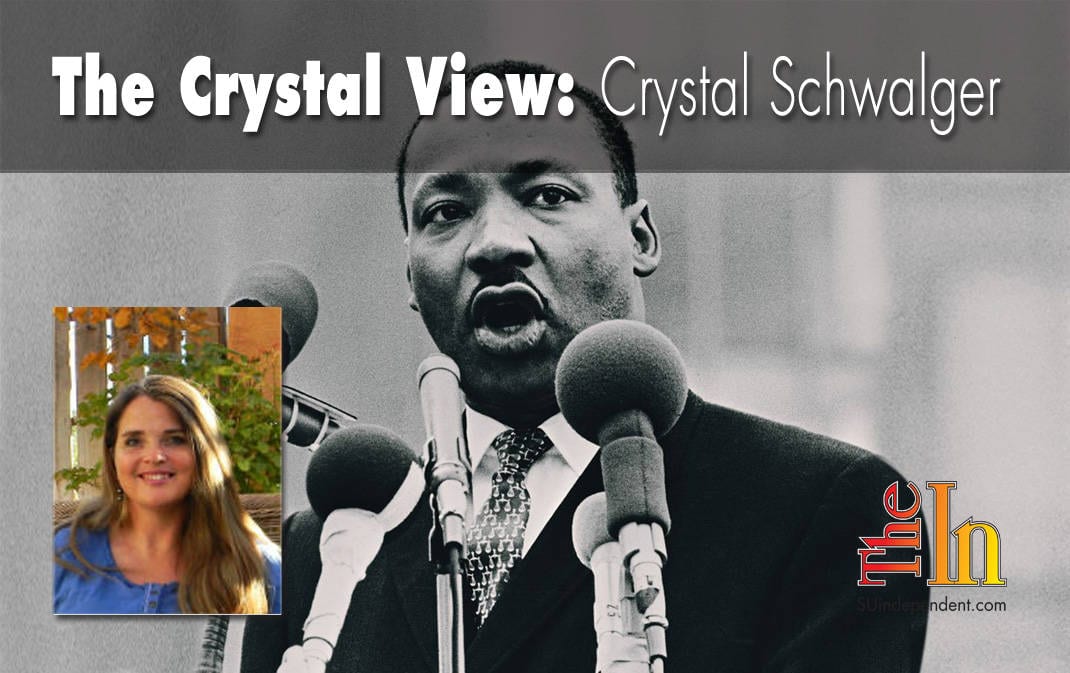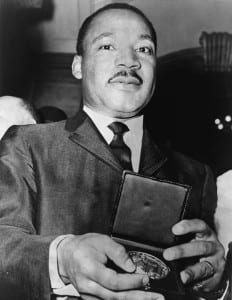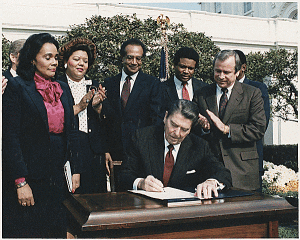 This past Monday marked the 30th anniversary that Martin Luther King Day was made a federal holiday. As with many other federal holidays, all government offices closed, children had the day off from school, and all banks, post office and other state businesses were closed as well. And just like several other federal holidays, many people saw it only as a day off from work or school and forgot the reason and the meaning of why Martin Luther King Day is a holiday and even if it still matters.
This past Monday marked the 30th anniversary that Martin Luther King Day was made a federal holiday. As with many other federal holidays, all government offices closed, children had the day off from school, and all banks, post office and other state businesses were closed as well. And just like several other federal holidays, many people saw it only as a day off from work or school and forgot the reason and the meaning of why Martin Luther King Day is a holiday and even if it still matters.
Dr. Martin Luther King Jr. was born on Jan. 15, 1929. He was a Baptist minister, a humanitarian, an activist, and he became the forefront leader in the African American Civil Rights movement in the 1960s.

He was man of principle who believed in God and whose voice and vision of a colorblind society inspired a nation.
Unlike many of the disgruntled and at times violent civil activist groups of today, Dr. King used his charismatic personality to inspire men to live better, to do better, and to be better. He was an example of courage, dignity, truth, justice, compassion, love and service. Instead of using hate speech and words that seek to divide, he advocated using nonviolent civil disobedience and words of inclusiveness to help change the hearts and minds of society. His words and voice filled the darkness of people’s hearts with hope and courage and inspired society to become a country where democracy was a reality for everyone, no matter where they come from or what the color of their skin was.
Change didn’t come easy, but he endured, leading not just by words but also by deeds. He put his life on the line for freedom and justice so that all could be partakers of the American dream. Ultimately he gave his life in that pursuit.
Controversial from the start, the making of Martin Luther King Day as a national holiday started just days after King’s assassination in 1968. A bill was introduced just four days after Dr. King’s death, and petitions numbering more than six million names were submitted to Congress. Though it was introduced year after year, Congress refused to pass it. This fact, however, did not stop or change the minds of those who supported the bill from petitioning governors and mayors around the country. In 1970, the City of New York held the very first commemoration on Dr. King’s birthday, followed by the City of St. Lewis in 1971. It was not until 1980 though, that Congress looked seriously at making Dr. King’s birthday a holiday.
 After much pressure and deliberation in Congress, it was finally signed into law by President Ronald Reagan in November 1983. However, it was not celebrated until January 1986, with only 17 states enacting the holiday. Three years later, 44 states endorsed the holiday, with other states — including Utah — calling it instead Civil Rights Day. Surprisingly, Utah was the last state to officially change the name to Martin Luther King Day in 2000. According to thekingcenter.org, as of 2016, at least 100 other nations around the world also celebrate and commemorate this day in some way.
After much pressure and deliberation in Congress, it was finally signed into law by President Ronald Reagan in November 1983. However, it was not celebrated until January 1986, with only 17 states enacting the holiday. Three years later, 44 states endorsed the holiday, with other states — including Utah — calling it instead Civil Rights Day. Surprisingly, Utah was the last state to officially change the name to Martin Luther King Day in 2000. According to thekingcenter.org, as of 2016, at least 100 other nations around the world also celebrate and commemorate this day in some way.
So why does remembering and celebrating Martin Luther King Day matter? Because we need to remember and know the past in order to change the future. We may not like what we see, but we have to understand it, own it, and then hopefully we are able to learn so that we do not repeat it. With our modern society, too many people forget that it wasn’t so long ago that we were separated by the color of our skin. It was a dark time in our country’s history, where those of African American — and I dare say, anyone of a darker skin — was treated unequally. At times, many endured humiliations, beating, lynching, and contempt simply because of the color of their skin.
As with many other dark times in history, there are always leaders who step forward, show the way, and become a beacon of hope to those who need it. Dr. Martin Luther King Jr. was one of these leaders when society needed hope more that hate. He taught in one of his many speeches that “Darkness cannot drive out darkness: only light can do that. Hate cannot drive out hate: only love can do that.” His legacy was one of love.
Coretta Scott King, Dr King’s widow, eloquently states on her commemorative page why we need to commemorate this day. She writes, “On this day we commemorate Dr. King’s great dream of a vibrant, multiracial nation united in justice, peace, and reconciliation; a nation that has a place at the table for children of every race, and room at the inn for every needy child. We are called on this holiday not merely to honor, but to celebrate the values of equality, tolerance, and interracial sister and brotherhood he so compellingly expressed in his great dream for America.”
She calls on all to use this day not only as a day of commemoration but as a day of service to help those who are in need of a helping hand in whatever way we can. It is my opinion that we not only use this day as a day of service and remembrance but that we take it forward the rest of the year, remembering the spirit of brotherhood and kindness and seeking to keep those values which make us a nation Dr. King would be proud of. For all of us who are the beneficiaries of his legacy, I am forever grateful to those who came before and endured so that we all can live the dream that we choose not being judged by the color of our skin but by the contents of our heart. Does Martin Luther King Day still matter? I, for one, believe it does.



